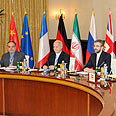
West, Iran to continue atom talks in Moscow
EU Foreign Policy Chief Catherine Ashton says significant differences remain between on nuclear program, but parties to maintain 'intensive contacts' ahead of Moscow meeting on June 18-19
Iran and world powers will meet in Moscow on June 18-19 to hold further talks to try solve a long-standing dispute about an Iranian nuclear energy program, European Union Foreign Policy Chief Catherine Ashton said on Thursday.
After discussions in Baghdad extended late into an unscheduled second day between envoys from Iran and the six powers, Ashton said it was clear both sides wanted progress and had some common ground, but significant differences remained.
Related stories:
- Diplomats: Iran installed more centrifuges at Fordow
- Iran presents proposals to world powers
- Israel skeptical on Iran nuke deal
"We will maintain intensive contacts with our Iranian counterparts to prepare a further meeting in Moscow," she told a news conference in Baghdad.
Ashton said the six powers wanted practical steps from Iran to address concerns over its nuclear work.
"Iran declared its readiness to address the issue of 20% enrichment and came with its own five point plan, including their assertion that we recognize their right to enrichment," Ashton added.
Earlier, Iranian negotiators rejected proposals by the six world powers to curb Tehran's nuclear program, and demanded answers to their own counteroffer meant to alleviate concerns about Iran's ability to build atomic weapons.
Saeed Jalili, Iran's top nuclear negotiator, demanded an overhaul to the plan put forward by the world powers after the Baghdad talks began Wednesday. An Iranian diplomat involved in the discussions said the package falls far short of a compromise.
Jalili conveyed his concerns in a private meeting Thursday with the European Union's foreign policy chief Catherine Ashton, who is formally leading the talks.
Meanwhile, Iranian media said that the world powers have aligned themselves with Israel on the nuclear issue. "The discourse of the six powers during the talks is very similar to that of Israel's prime minister and his defense minister," the al-Alam TV said.
Iran's Mehr and Fars news agencies voiced similar sentiment and claimed that the powers failed to issue a clear response to Tehran's counter proposal. Fars accused the six of trying to stall and cause a collapse of the talks.
At the heart of the issue are two different proposals. On one side is an incentive package by the six-nation group - the United States, Russia, China, Britain, France and Germany - that seeks to halt the most sensitive part of Iran's nuclear fuel production.

Catherine Ashton and Saeed Jalili (Photo: AP)
Iran, on its part, wants the US and Europe to ease harsh economic sanctions on its oil exports in return for pledges to give wider access for UN inspectors and other concessions.
Western package
The Western package calls on Tehran to end its enrichment of uranium to 20%, considered a short technical step away from warhead grade. In exchange they offered benefits, including medical isotopes, some nuclear safety cooperation and spare parts for civilian airliners that are needed in Iran.
But they snubbed Iranian calls for an immediate easing of significant economic sanctions imposed on Tehran for flouting UN Security Council resolutions that demand the suspension of all enrichment.
Earlier on Thursday, an Iranian delegation official said that the world powers are hindering talks, creating a "difficult atmosphere".
"What we heard in Istanbul was more interesting... We believe the reason P5+1 is not able to reach a result is America," the official said, asking not to be named. "(P5+1) came to Baghdad without a clear mandate so we think the atmosphere is difficult."
Dudi Cohen, Reuters and AP contributed to this report
- Receive Ynetnews updates directly to your desktop










